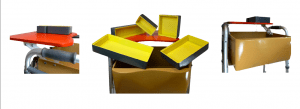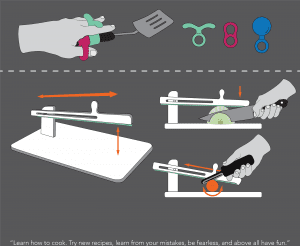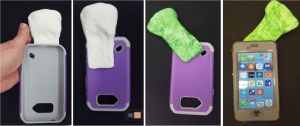In this juried competition, students from across the country submitted designs that used principles of Universal Design that support aging in place to either re-conceptualize an interior or develop a new product.Click here to read more about the 2016 competition.
1st Place Winner
MODU
Lamar Pi, San Francisco State University, CA, Industrial Design Program

MODU is designed to assist those who face mobility challenges by supporting independence in the home environment. The intent is to create a universal tray, along with an ecosystem of accessories, which is highly modular and customizable per user for existing, widely used products on the market such as the walker, rollator, and wheelchair. We aspire for users to become more independent and confident to complete everyday tasks around the house, ultimately improving the quality of life, and enabling users to age in place.
View Design Presentation
View Design Description and Process



